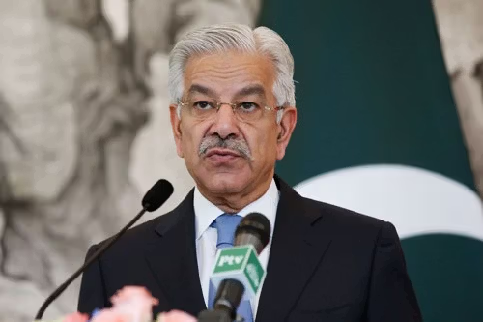RASC News Agency: As tensions between Islamabad and the Afghanistani Taliban reach new heights, Pakistan’s Defense Minister Khawaja Asif has hinted at the possibility of reviving dialogue with the group.
In an interview with Geo News, Asif said that if Turkey and Qatar two of Pakistan’s close allies were to propose resuming talks, Islamabad would likely not reject the offer.
Asif praised the mediating role of Turkish President Recep Tayyip Erdogan, noting that during the recent Istanbul negotiations, the Taliban had “verbally accepted” certain issues but refused to provide written guarantees a move he described as the main obstacle to progress.
The defense minister also admitted that the Taliban’s internal structure “lacks unity and cohesion,” which he said has prevented the negotiations from achieving concrete outcomes.
The third round of talks between the two sides was held in Istanbul on Sunday (November 9) but, like previous rounds, ended without tangible results. Diplomatic sources reported that both delegations accused the other of blocking progress by presenting unacceptable preconditions.
Meanwhile, Mohammad Naeem, deputy foreign minister of the Taliban, offered a different account of the Istanbul discussions in a meeting with foreign diplomats in Kabul.
He claimed that the Pakistani delegation had brought “unrealistic and impractical demands” to the table and sought to shift responsibility for Pakistan’s internal security crisis onto the Afghan Taliban.
Naeem alleged that certain military circles in Pakistan were deliberately fueling tensions between the two countries because they benefit politically and militarily from the ongoing crisis. According to him, this approach has undermined regional mediation efforts.
He added that the Taliban remain in contact with mediating nations, including Turkey and Qatar, and would be ready to pursue diplomatic solutions if Pakistan approaches the talks with sincerity and realism.
However, the core dispute remains unresolved.
Islamabad insists that Tehrik-i-Taliban Pakistan (TTP) commanders responsible for dozens of deadly attacks inside Pakistan have safe havens in Afghanistan and enjoy tacit support from the Afghanistani Taliban.
The Taliban, in turn, accuse Pakistan of violating Afghanistan’s sovereignty through cross-border attacks and political pressure, calling Islamabad’s demands unreasonable and one-sided.
Taliban Foreign Minister Amir Khan Muttaqi said that the Pakistani delegation in Istanbul had sought “broad security guarantees,” which he described as unrealistic under current conditions.
While mediation efforts by Turkey and Qatar have sparked a faint glimmer of diplomatic hope, the reality remains stark: deep mistrust, the Taliban’s fragmented leadership, and rising border insecurity have kept the talks trapped in a fragile stalemate.
Islamabad, grappling with domestic security threats and a surge in TTP attacks, seeks assurances from Kabul
while the Taliban are determined not to be seen as subordinates or scapegoats for Pakistan’s internal crises.
In such an atmosphere, analysts believe that even if another round of negotiations is held under the guidance of friendly mediators, a real breakthrough remains a distant prospect.






